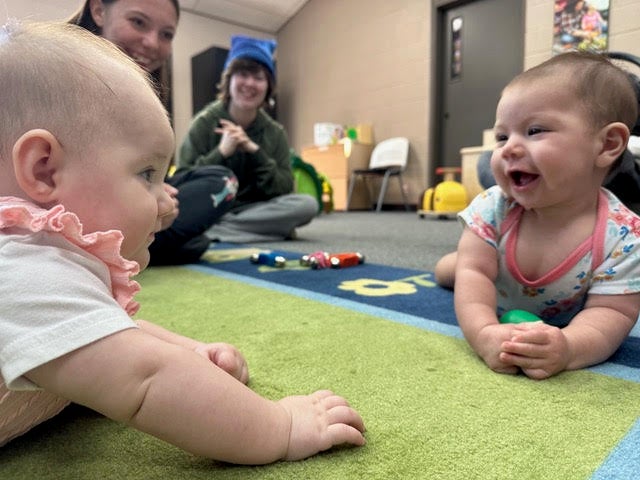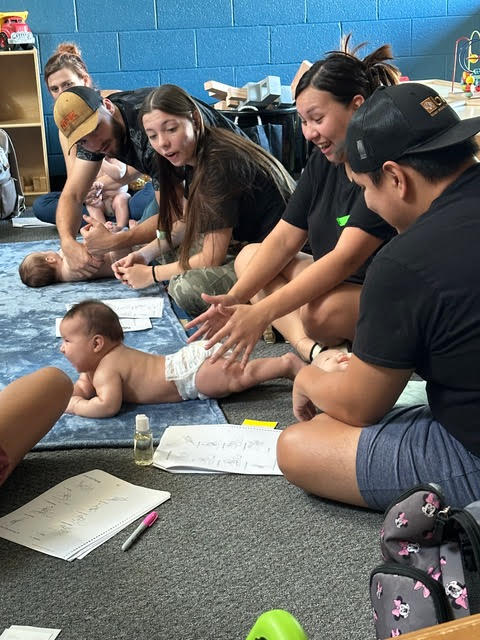By Nurture Connection
They may come for the free diapers, but they stay for so much more.
While baby supplies like diapers, formula, and car seats bring parents and caregivers to Legacy Parenting Center in Shawnee, Oklahoma, it’s the connections and support for themselves — and the well-being of their babies, infants, and young children — that have made this nonprofit parenting education center a thriving community hub.
For its part, the team at Legacy recognizes the importance of nurturing secure, positive relationships to build healthier, more bonded families. In its programs, Early Relational Health (ERH) principles act as a central guide for how the organization engages with and partners with families. In fact, ERH is embedded in everything Legacy does to meet the needs of its families. “If a mother didn’t grow up in a nurturing environment, it’s not something that comes naturally as she parents her children. At Legacy, we work to first build relationships with parents so we can earn their trust as we help them learn about emotional regulation, social connection, and nurturing parenting techniques,” said Lacey Holt, the center’s executive director.
Legacy Parenting Center, located about 30 minutes east of Oklahoma City, opened its doors in 2015, initially to serve pregnant mothers, parents and caregivers, and babies. The center serves diverse residents, including Native American, Black, and Latino families who seek assistance, skills, and support during their children’s formative years. The center, open to parents from two counties and surrounding cities regardless of income, now distributes about 31,000 diapers a month and partners with families of children up to age 5.
In the early days, the center handed out diapers to any parent who came to its free video-based parenting education classes. The organization initially partnered with about eight families a month; now it sees on average about 488 babies a month. In 2024, the center led more than 66,600 minutes of parent education, 941 playroom sessions, and 82 group classes; helped 834 babies; and distributed 379,300 diapers.
Parents and caregivers who take classes amass points via the center’s novel parenting rewards system, the Earn While You Learn Parent Education Program. Points can be redeemed at The Legacy Store, which carries diapers, clothing, car seats, cribs, baby equipment, and other parenting supplies. “There’s something about being able to shop that feels like a hand up instead of a handout,” says Holt, who joined the organization in 2017. Most of the store’s items are donated by the community. It’s a curated selection displayed with style. “We’ve tried to make the store feel like a boutique,” she says, “so it’s empowering when parents come and shop.”

“The playroom allows us to get on the floor and model parenting skills and talk through parenting challenges.
It allows us to get to know families more. You can learn a lot through interaction.”
“Change Happens When You Start to Build Trust and Share Your Hearts”
Participants range in age from 15 to 73 — from mothers in middle school to grandparents raising grandchildren. The center focuses on the early years, since they’re the most important in building a strong foundation for positive attachment, brain development, and overall future well-being, says Holt. Legacy also serves as a Family Resource Center (FRC) through the Oklahoma Family Support Network (OFSN), offering families connections to other agencies and services.
The self-styled small but mighty organization has grown from a team of 2 to 15 staff and dozens of volunteers. The family services team includes a lactation consultant, parent educators, and family navigators. The center’s client base has grown by word of mouth — and because of need. “People started coming to us because we were the diaper bank and the only way to get diapers was to come to our classes,” says Holt. “But they keep coming back because we know them and we love them and they feel safe. That’s when the change happens: when you build trust and they start disclosing things and you can really help them with more than just a diaper.”
Initially, parents earned points watching parenting videos. The curriculum covers prenatal development, infant and child milestones, and toddler and preschooler behavior concerns. The center has expanded to include a playroom that offers opportunities for education, socialization, mentoring — and store points. “The videos got us in the door, but the playroom allows us to get on the floor and model parenting skills and talk through parenting challenges,” says Holt. “It allows us to get to know families more. You can learn a lot through interaction.”
The program is designed to foster parenting resilience and confidence via individual and group-based services. “We want to build stronger, healthier families through education, resources, and mentoring,” says Holt, who has a background in infant and child development. “No one is ever alone when they come to Legacy because we believe that relationships drive change.”
Partnership with Foundation Focused on Early Childhood Education
In May 2024, the center partnered with the private Potts Family Foundation, which provides financial support and technical assistance to nonprofits engaged in early childhood education and capacity building (via its Know and Grow Initiative). With the foundation’s help, the center was able to build out its playroom and offer behavioral health services for both children and adults. The foundation was awarded state funding to support families with young children who were born just before, during, and right after the pandemic, says the foundation’s Audra Haney, an Early Relational Health specialist and director of the Oklahoma Association of Infant & Early Childhood Mental Health. The pandemic had a significant impact on ERH and overall development and well-being, including socialization, especially among young children.
During the pandemic, the center shifted to providing resources via a curbside model and, with emergency assistance funding in place, suspended the education requirement for tangible assistance. The center has kept that drive-up program running post-pandemic with a tweak: Four times a year, caregivers can request emergency assistance for diapers, wipes, and formula and the center will deliver the supplies curbside. “The pandemic actually helped us recognize we do need to be a support for concrete resources and not have rigid requirements in order for families to get them,” says Holt, who notes that diaper needs are a leading cause of child abuse.
The foundation works with grantees around the state in a systems-wide way to support Early Relational Health efforts. It sees Family Resource Center partners such as Legacy as the folks on the ground who translate the language and thinking behind ERH into tangible practice in their communities. Says Haney: “That’s where the magic happens.”

“We want to build stronger, healthier families through education, resources, and mentoring.
No one is ever alone when they come to Legacy because we believe that relationships drive change.”
Community Context Is Key
Legacy has a lot of community partners: Health department staff teach infant massage and child behavior classes. A local instructor from Gordon Cooper Technology Center offers infant and child CPR instruction. Library staff add story time and music and movement to the mix. Legacy also works closely with local tribes and WIC offices. The center has grown up alongside its clients. In 2024, Legacy expanded again, including a class called Wonder Years, designed to help 3- to 5-year-olds socialize. The center hopes that parents of preschoolers will mentor the next generation of new parents and share their lived experience.
Caregivers of babies and young children need a place to connect, vent, learn, observe, mentor, model, and develop their own parenting style and voice. “Early Relational Health is everyone’s business. It isn’t just the parent’s or caregiver’s concern, or even the provider who’s working with a parent or a caregiver,” says Haney. “It’s the whole community coming together around a family. When we strengthen community, we strengthen the context where families and babies are living, we strengthen the capacity to support that relationship. That includes cultural humility, listening, being intentional, and partnering so we respond in meaningful ways.”
This blog post is part of Nurture Connection’s “ERH in Action” series of listening and learning sessions. Our network is full of meaningful examples of people and organizations promoting ERH in their daily lives and work. Our “ERH in Action” series highlights and uplifts stories from various fields to share learnings, challenges, and bright spots in the movement.
